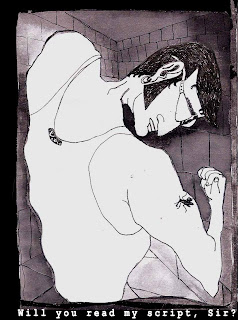He forgot to say, "trouble for us, for the administration", but I wasn't going to correct him, as I was sitting in the police station, charged by local Congress goons for tarnishing the image of Dharavi. I had insisted on coming in the police van, much to the embarrassment of the two police officers summoned by the goons on 60 ft Road.
"No, no, madam, come in your own car."
"No, no,' I said, 'what if I run away? These people (the goons) don't trust me."
"But we trust you, madam."
I jumped into the police jeep anyway, enjoying their discomfiture.
At the police station, the goons kept marching in, until 2 went up to 25. They went on about media people exposing the nakedness of poor people in front of foreigners. I tried to tell them our program was on the industry in Dharavi, but they were insistent that we were shooting gutters.
The cameraman showed them the footage on the tape in the camera. They were impatient and wanted it fast-forwarded. The camera attendant explained that would damage the head of the camera. For 20 minutes, they peered into the viewfinder, looking for incriminating evidence. When they could not find it, one of them said, "What is the meaning of taking so many shots of the road, for so much time?" I said, "I must give you some film editing lessons then."
Offended, they began to rant about a recent documentary appearing on National Geographic that has some shots of children shitting on the roads, and a local activist's interview. It was hard to understand whether they were angrier about the crap or the activist. They all wanted to show him his place.
The angriest one said, "They are showing Dharavi as it was 40 years ago."
Since the said documentary was made a few months ago, at the most a year or so ago, I did not comprehend how it represented a Dharavi from a bygone past. Or what it had to do with our crew. But this was hardly about logic, was it?
Two policemen meanwhile diligently pored through a fat manual, wondering what they could charge me with. The other police staff looked quite fed up. They were all keen to go to lunch.
A little man in white shirt and white trousers showed up. I smiled at him in relief, because he had worked with us on the Secret Millionaire show. Turns out that he is the master brain behind this 'issue'. He has decided that all foreign traffic and all film shoots in Dharavi will be routed through him. So he refused to acknowledge me at first, then tried to bring me around to his point of view.
A couple of his goons came upfront and asked my white producer to dole out 5000/- to each of the goons for the trouble they had taken in creating this ruckus. Luck was on our side, because in fact, we were through with almost all our shoot, except a few general shots. So we could afford not to get agitated. Unable to understand this, they began instigating the policemen to check the back of our car, check all our equipment, check the passports and visas of the foreigners. "Who knows what they are doing here?" one said.
A police official shooed away the goons irritably, "Get out of my office. This is not some criminal or murder case, that you are surrounding her." He grumbled about how these people walked in and out of the station, as if it was their father's kingdom.
The police decided to fine the crew 5000/- on the charge of our not informing the local police station about the shoot. An officer said apologetically, "This is only a deposit, madam. You can go to the court on Monday morning with the receipt. The judge will charge you 2-300 rupees and give you the rest back. It's a minor offense."
The little man called my colleague later to say, "We have all these boys in the party. We have to take care of them. You should help with funds."
The next day, he called me twice, to ascertain where and what we were shooting. "Are you in Dharavi,' he asked, 'I saw your car there." I said, "Am I meant to report to you every morning?" "No, no,' he said, 'just let me know where you are. Then my boys won't trouble you. I had to take them all out last night, to cool them down. We'll talk over the charges later."
I wondered if the boys would not be better employed making more public toilets in Dharavi, rather than worrying about photographs of children shitting. But apparently, the image of Dharavi will remain intact if the little man and his party boys get a commission from the film production budget.
I said to him, "You've done more to spoil the image of Dharavi with your goonda-gardi, than anything we could do with our camera."
He said, "Oh, boys will be boys. We have to employ these low-level types in the party."
God save Dharavi, God save the nation from the party boys.
I must say this for the Mumbai police. There were 7 men in the crew and me. Not once did they question my authority as a woman in representing these 7 men. I don't think that would have happened in many other states, in the country.














